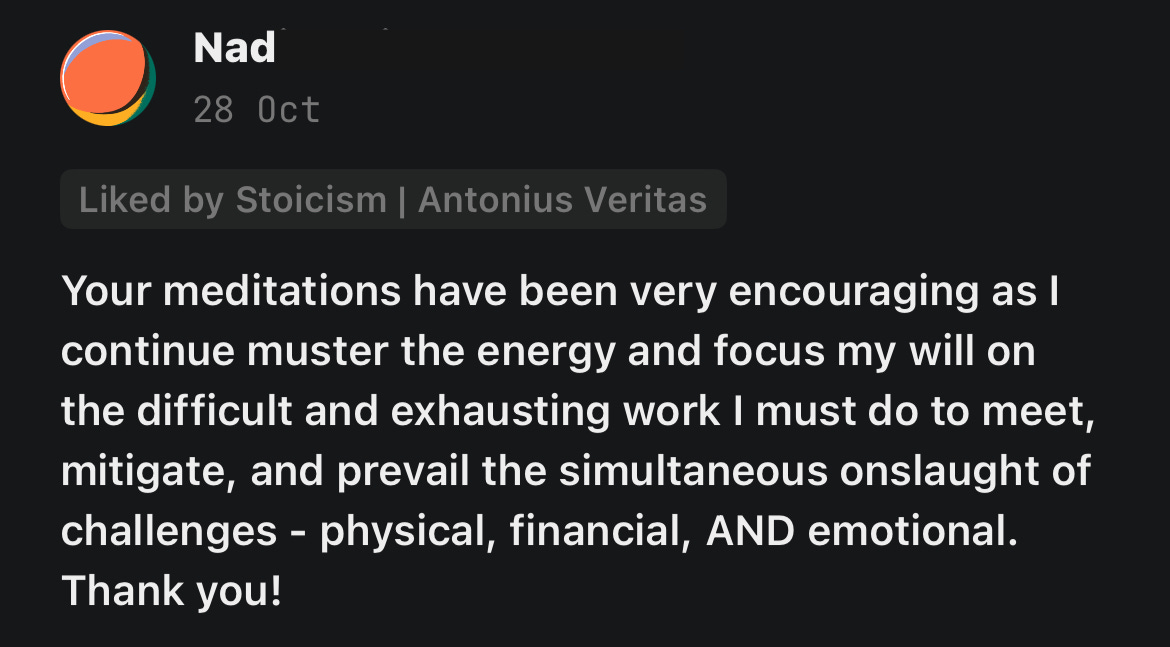LVIII. On What’s Truly Within Your Control
The things in our control are by nature free, unhindered, and unobstructed, while those not in our control are weak, slavish, can be hindered, and are not our own.
The ‘Neuroscience-based Tools’ & ‘Lead to Win’ sections are companions for The Stoic Manual to help you become wealthier, happier & more powerful by boosting your stress resilience, focus, motivation, relationships, overall health, and leadership skills—by Dr. Antonius Veritas.
P.S: Skip to the end for a mini-course, a step-by-step practical guide to help you master this Stoic approach and live with clarity, resilience, and fun. You’ll also get a Notion Journal template to help you make this practice successful.
“Some things are in our control, while others are not. We control our opinion, choice, desire, aversion, and, in a word, everything of our own doing. We don’t control our body, property, reputation, position, and, in a word, everything not of our own doing. Even more, the things in our control are by nature free, unhindered, and unobstructed, while those not in our control are weak, slavish, can be hindered, and are not our own.”—Epictetus
What truly lies within our control?
The answer to this question is the keystone of peace, happiness, power, prosperity, and a fulfilled life.
It’s not that the world bends to our will when we understand this truth.
Far from it.
See, people will falter, events will spiral out of our grasp, we’ll meet with uncertainty, and the future will continue to unfold in ways that confound even the most careful of plans.
Seasoned war generals, founders, and strategists know that truth.
Yet, amidst this unpredictability, there is a sanctuary that cannot be breached.
This is the Inner Citadel Pierre Hadot talked about.
Our thoughts, opinions, desires, aversions, choices, and actions—these are the only things that are truly ours, our role in life’s events, and within them lies the foundation for a life well-lived.
Everything else is neither good nor bad.
It’s how we become invincible.
As Sun Tzu put it,
“That general is skillful in attack whose opponent does not know what to defend; and he is skillful in defense whose opponent does not know what to attack.”
To live well, we must first accept a truth that the ego resists because it’s scary.
Most of life is outside our grasp.
What others think of us, the outcomes of our labor, or the unfolding of events—these are not ours to command.
Yes, we can influence results, but we can’t ascertain them.
And anyone telling you otherwise is playing on humanity’s sickness to need certainty and you’re being conned.
We must therefore surrender to reality.
What we do control, is how we meet these uncertainties: with courage or fear, with adeptness or incompetence, with grace or bitterness.
Recognizing the boundary beyond which our actions become futile is liberating because it frees us from the exhausting battle to control what’s impossible to fully control.
I believe you’re quite intelligent and practical.
And you wouldn’t hanker to waste your precious life on what doesn’t make a difference.
The practice of staying within this sphere of control begins with our thoughts.
We often imagine ourselves as victims of our mental chatter, but this is not true.
With effort and intention, we can steer our minds away from fear, resentment, and doubt.
We can choose to focus on thoughts that are productive, loving, or even playful.
We can choose to meet our fears, face our demons, and take actions that affirm our confidence.
That is all is within our control and is all we can do.
To reclaim our minds is not to deny these feelings but to meet them with clarity.
When mistrust, fear, worry, or other emotions surface, we can pause and question their validity and usefulness.
P.S: I’ll teach you how to apply this critical thinking in the practical section.This deliberate filtering of our mental chatter transforms us from passive spectators into active participants in shaping our emotional landscape.
For example, consider the temptation to dwell on slights or misunderstandings.
By choosing instead to focus on what we can clarify or forgive, we get to protect our peace and fortify our relationships.
Thoughts that uplift, inspire, or simply calm us are tools for building a life rooted in strength.
Taking action within our sphere of control is where thought becomes tangible.
Where intention meets the world.
There is dignity in choosing forgiveness over grudges.
In choosing love and kindness, even when it’s not returned.
There is respect, confidence, strength, and honor in putting forth effort, even when results fall short.
To listen attentively, to lend a hand, to have better habits, to forgive—these small gestures affirm our commitment to influence what we control.
And seeing that as enough is what helps us handle life’s uncertainties and tough situations with equanimity.
It’s what helps us seize our glorious destiny.
Our actions may seem futile, but looking beyond this myopia, they transform us, prepare us for the future, kickstart a domino effect of success & opportunities, and give us a deeper sense of purpose.
Consider this.
Holding the door for a stranger or smiling at them, even on a day when we feel sad and unseen, affirms our commitment to kindness. And in extension, we become better partners in our relationships.
Offering a sincere apology with confidence because it’s right, without seeing it as demeaning, strengthens our character. And in extension, we become better leaders.
These are not grandiose acts but deliberate choices that align us with who we want to become because it’s all we can do that’s useful.
The freedom we gain from focusing on what is ours does not mean we ignore the world.
It means we engage with it wisely, without being enslaved, perturbed, or sabotaged by it.
Pain, pleasure, and external validation lose their grip on us because we know we don’t control their occurrence in our lives.
We act not to impress or retaliate but because it is the right thing to do—the rational thing to do, and this clarity gives us peace and a wellspring of happiness to sustain us when we need it most.
It allows us to live fully, embracing both joy and sorrow without being consumed by either.
To control what is within us is not to demand perfection, it’s to embrace progress.
We will falter, make mistakes, think vile & absurd thoughts, and encounter the darker corners of ourselves.
This is not failure—it is humanity.
Growth comes not from denying these flaws or bashing ourselves for them, but from engaging with them honestly and compassionately.
We must treat ourselves as we would a friend: forgiving yet firm, encouraging yet uncompromising in our pursuit of betterment.
We must never give up on ourselves.
We must, as my favorite artist Future says,
“accept our flaws.”
The beauty of this practice is that it requires no external validation.
When we choose to live with high standards, noble thoughts, healthy desires, true beliefs, justified hate that doesn’t overcome and poison us, and effective systems, we create a quiet sense of self-respect that no criticism or failure can erode. For,
“We control our reasoned choice and all acts that depend on that moral will.” —Epictetus
That is true freedom: the ability to live honorably and do our best in our craft because it’s only what we control and nobody or nothing can touch it.
Because it’s the only stable strategic focal point, the fertile ground from which every visionary seed of our ambition flourishes.
Reclaim Control: Practical Ways to Master What’s Truly Yours
Living within your sphere of control sounds simple
But when life starts throwing punches, it’ll feel like a lofty ideal that’s impossible to reach.
People will misunderstand you. Things won’t go as planned. And no matter how much effort you pour into something, the results might disappoint you.
Frustrating, isn’t it?
But what if there was a way to stop getting knocked around by what’s out of your hands and focus, fully and powerfully, on what is?
Let’s dive into practical, no-fluff ways to master this approach and live with clarity, resilience, and maybe even a sense of fun.
You’ll also get how-to’s, scenario examples, and an accompanying Journal Template courtesy of Notion to help you integrate this practice into your daily life.
Do you like this entry so far? ⭐️
Support the publication to read the rest and access 100+ practical insights and Mini-courses to help you apply Stoicism for a happier, wealthier life—Lead to Win, Optimize Your Health with Neuroscience-based tools & Stoic Essays.
Join 12,000+ other readers.
Here’s what my supporters are saying.








